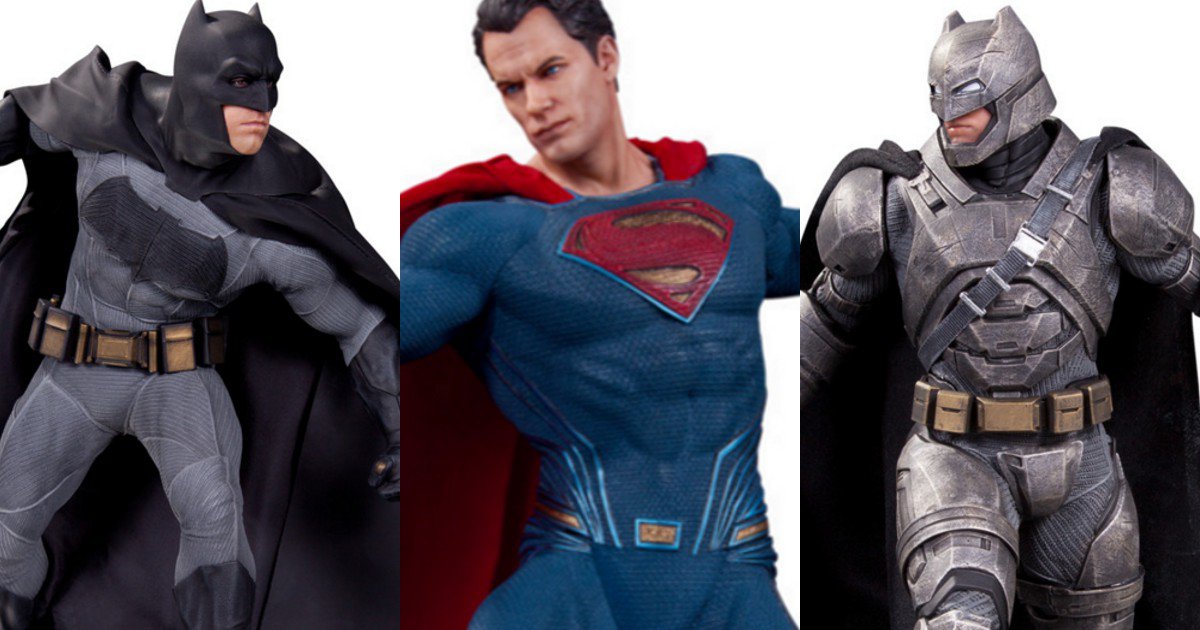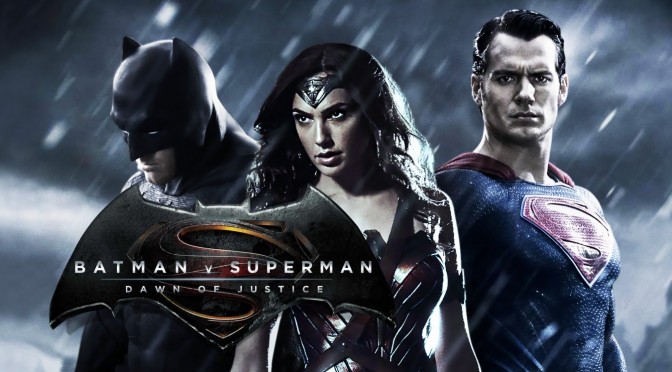And I do mean “epic” in the classic sense. The Lex Luthor character (more on him later) can’t stop reminding us that Superman is a god; that he must battle against man; and Lex makes repeated references to Greek mythology that must have also been on the minds of Siegel and Schuster when they dreamed up their “super-man” some 80 years ago.
By the end of the movie, the last son of Krypton does prove himself to be a Messiah figure of sorts…again.
Mythology was certainly on Frank Miller’s mind some 30 years ago when he set about changing the Batman mythos forever. Big-screen Batman adaptations have paid homage to The Dark Knight Returns since 1989. But none more than this one. The showdown between the Man of Steel and the Caped Crusader was ripped almost directly from Miller’s mini-series. Both the catalyst and the result were different, and the Batman was determined to win this time (rather than intentionally taking a dive and faking his own death as in Miller’s yarn).

Also, having been something of a superhero afficionado up until the time of Dark Knight Returns, I am pretty confident that Miller was the first one to overtly depict Superman as an earth-bound god.
Dawn of Justice is a symphony of spectacular destruction with a lot going for it. First of all, as desperate as they must be to duplicate the success of their rival, DC did not cut-and-paste the Marvel Studios formula and insert their own characters. I was a little worried that a Justice League flick might be a thinly-veiled Avengers clone (and the next one might very well prove to be), so kudos to DC for telling their own story about their three all-time most stalwart characters.
Second, although there were smatterings of action along the way, the director opted for a slow, tense build toward the epic finale. It reminds me somewhat of how Akira Kurosawa paced some of my favorite samurai films, driving viewers to the edge of their seats, begging for an explosive, violent extravaganza to settle the conflict. (And boy, this movie delivers, with the stunning visuals and rip-snorting special effects comic book fans want in a film adaptation, but were simply not possible technologically until relatively recently.)
 My reaction to the casting leans positive. Superman/Clark Kent was portrayed well–it’s a darker, edgier Superman than the historical model, but the actor pulls it off adequately. His physical movements do seem a bit stiff, however. The actress who plays Wonder Woman/Diana Prince also did quite well, though she is such exquisite eye candy that her acting is something of an afterthought to a red-blooded heterosexual male. I have a lot to say about her (the character, more than the actress) that I’ll probably reserve for a seperate post. And the hot topic ever since casting was first announced, of course, is Batman/Bruce Wayne. It’s really not as bad as some might fear. I would have preferred someone other than Michael Keaton in 1989; and I would have preferred someone other than Ben Affleck in 2016. However, Affleck did OK. He was much less situationally aware (especially during fight scenes) than the Batman of comic book canon…but really, all the screen versions of the character have been.
My reaction to the casting leans positive. Superman/Clark Kent was portrayed well–it’s a darker, edgier Superman than the historical model, but the actor pulls it off adequately. His physical movements do seem a bit stiff, however. The actress who plays Wonder Woman/Diana Prince also did quite well, though she is such exquisite eye candy that her acting is something of an afterthought to a red-blooded heterosexual male. I have a lot to say about her (the character, more than the actress) that I’ll probably reserve for a seperate post. And the hot topic ever since casting was first announced, of course, is Batman/Bruce Wayne. It’s really not as bad as some might fear. I would have preferred someone other than Michael Keaton in 1989; and I would have preferred someone other than Ben Affleck in 2016. However, Affleck did OK. He was much less situationally aware (especially during fight scenes) than the Batman of comic book canon…but really, all the screen versions of the character have been.
I already mentioned that the tension builds quite nicely to the climax; but the plot is not without its weaknesses. The whole thing seems like a forced contrivance if you examine it too closely. And the flashbacks/dreams/visions were a touch overdone–with the Batman, particularly. Superman does undertake a successful vision quest in the midst of the film, which I would have appreciated more, had I not already been overexposed to the unnecessary (and at one point, confusing) visions/nightmares/flashbacks of Bruce Wayne.
There were some impediments to the suspension of disbelief. For instance: if nuclear weapons work differently in this alternate universe (where masked vigilantes and “meta-humans” exist) than they do in our universe, then that should really be established beforehand.
Every director wants to put his/her “own stamp” on the material s/he’s adapting, and this movie was no exception. This is unfortunate with regards to two characters in particular.
ALFRED: Certainly the character has evolved. Again, the first and biggest step may have been in Miller’s mini-series when he revealed that the Wayne’s butler was a “combat medic” who apparently was a Wayne household staple all Bruce’s life, instead of coming on the scene after the war on crime began and discovering Bruce’s nocturnal activities later. The Gotham TV show took it another step by making Alfred a former British Commando who teaches young Bruce how to fight. And this movie picks up from there, basically turning Alfred into Batman’s command center, and at times the brains of the operation. Yawn. Maybe the transformation of Alfred into Jarvis will be completed in the next character reboot and he’ll simply be an artificial intelligence in the Batcomputer with a British accent. Neither comic book writers nor Hollywood directors ever tire of fixing what’s not broken.
MARK ZUCKERBERG I mean LEX LUTHOR: I’m not sure if the actor was trying to channel Heath Ledger’s Joker performance or Jim Carey’s abysmal Riddler interpretation. Whatever he was going for, it was lame. Luthor has historically been an evil genius, and that is how the character works best. Some left-wing “visionary” in the 1980s turned him into an evil capitalist caraciture from Karl Marx’s dystopian fantasies, and over time the criminal genius aspect of the character has been forgotten. With this movie the next step has been forced in his devolution, so that now he is an evil capitalist LUNATIC with an abusive father, tortured childhood, blah blah blah. Certainly there are supervillains which this cliche fits. Lex Luthor is not one of them.
Oh yeah: there’s also another bad choice in this category.
SOME SENATOR WITH A WEIRD VOICE: A character made necessary only by an unnecessary subplot that was tacked on and is redundant of the Batman’s motive for opposing Superman. She’s a Democrat who is the opposite of any real-life Democrat (she’s concerned about individual rights, Constitutional limitations on power, etc.) but exactly the image Democrats attempt to portray to the gullible electorate. And the masquerade usually succeeds, with the abettment of the press, academia and pop culture (including/especially Hollywood).
There’s a lot more I could say about Dawn of Justice, but this should be enough information for you to decide whether it’s worth the time and ticket price. Wonder Woman will get her own post.

